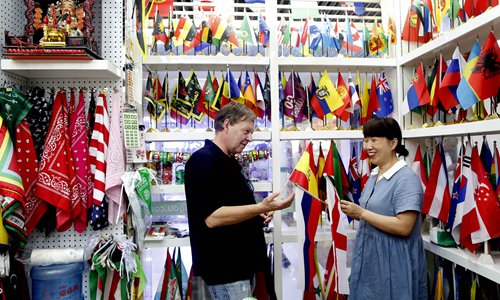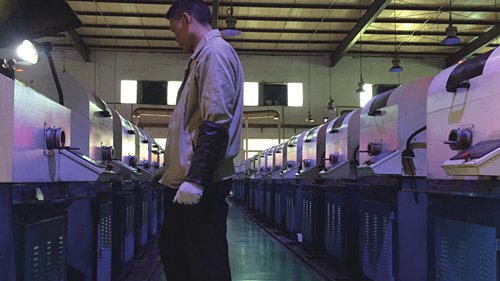
A businessman from Sweden shops for flags at the Yiwu International Trade City, East China's Zhejiang Province, on July 6. Photo: VCG

A worker produces magnets at Jinconn in February. Photo: Chen Qingqing/GT
Jiang Jiangping might not celebrate Christmas, but his business depends on him being in a permanent holiday spirit. Owner of a Christmas gift factory in Yiwu, East China's Zhejiang Province, Jiang, now in his 40s, was one of the first to get into the business of exporting Christmas decorations from China, a country where the vast majority do not celebrate Christmas, certainly not in 1999, when he started.
Now owning just one among the thousands of festive-oriented businesses in Yiwu, Jiang's day starts in a mini store in the Christmas subdivision of the Yiwu International Trade City, known as the world's largest small commodities wholesale market.
In 2017, Yiwu's GDP reached 115.8 billion yuan ($16.68 billion), an almost 10-fold increase compared with the 13.6 billion yuan in 2001.
In his packed showroom of under 9 square meters, Santa hats, stockings and tinsel jostle for space. Jiang calculates the number of orders from his foreign customers, and his factory, where he employs more than 100 workers, churns out seasonal items all year round based on customer demand, before they are shipped abroad.
Although he started his business years into China's reform and opening-up era, it was not until 2001, right after China's entry into the WTO, that Jiang received his first foreign order from a customer in Spain.
He earned 20,000 yuan from that first order, which was worth a total of 64,000 yuan. "At that time, it was such a big amount I could never imagine it - it's equal to around 400,000 yuan now," Jiang told the Global Times.
"Since we entered the WTO, foreign customers from other countries, especially those from Europe have flocked to Yiwu, and in recent years, we've seen more from Thailand, Nigeria and other African countries," Jiang said.
"But during that time, they came here just for our cheap prices," Jiang added.
"For small commodity traders like us, lower prices are the key factor to beating out our competitors. But I've been trying to improve the quality of our products in the past years," Jiang said. "'Made in Yiwu' is no longer linked with cheap and low quality now, Yiwu products are with good quality but sell at a reasonable price."
"And we are trying to explore more ways, for example, e-commerce, to coping with the changing situation," Jiang said.
Omar Khan, a wholesale trader from Saudi Arabia, told the Global Times that although other countries, such as Vietnam and India, are also becoming rising manufacturing powers, "Yiwu is the only place where you can find everything, from low-end to high-end, from toys to electronics products."
"For eight years, I have come to Yiwu every year, or even twice a year to buy small commodities for back home. These 'Made in China' products, although small, have absolutely changed our lifestyle," he said.
"Or even our children's," Khan added, showing the toy car in his hand. "My 5-year-old son likes this so much, and I can always find something he likes here in Yiwu."
Attracting Buyers
Meantime, Dongguan, a city in South China, another manufacturing center that rose alongside China's reform and opening-up process, as well as its WTO entry, is also experiencing a major transformation.
Different from Yiwu, which has always focused on small commodities, the city in South China's Guangdong Province in the heart of the Pearl River Delta Economic Zone, is transforming from the "world's factory" into a high-tech manufacturing hub of less labor-intensive industries which use more automation and smart technologies.
Chen Liang, general manager of Dongguan Jinconn New Material Holdings Co, a private company focused on production and processing of magnets, used for electronic goods such as smartphones, told the Global Times that when he took the company to the world's largest electronics trade show, the Consumer Electronics Show (CES) 2018 in Las Vegas, he found that even some designers and engineers from Silicon Valley were marveling at how a magnet can be so small.
"Industrial materials are becoming more functional and smaller in size, which has inspired product designers to make adjustments according to the material size," Chen said.
Behind the small magnet is a complete industrial chain ranging from mining and refining of rare earths, manufacturing of blanks to later processing, the core technology of which is wholly grasped by Jinconn, Chen noted.
"Since the company's debut at the CES at the beginning of this year, Jinconn's potential partners from the US, Austria, Turkey and Iraq have visited the factory and we've cooperated with them on customized magnet supply," he added.
Yiwu and Dongguan are just two examples of how China has grown into a world manufacturing power. They also show how China has impressed the world with its 'Made in China' products, which have moved from being cheap small commodities to cost-effective products featuring good quality and advanced technology. Chinese traders in hundreds of cities like Yiwu and Dongguan made China into the growth engine of the world economy, with the country contributing more than 30 percent to world economic growth since 2002, a year after its entry into the WTO.


